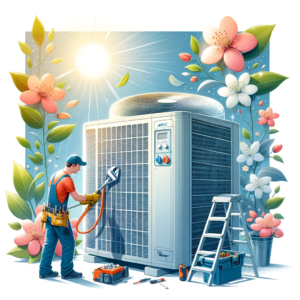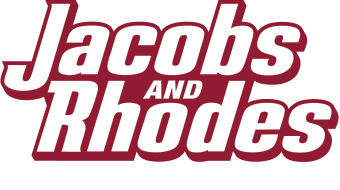Spring HVAC Upgrade: Preparing for High Usage
 As the spring season approaches, bringing with it warmer temperatures and the promise of summer, it’s crucial for homeowners and property managers to prepare their air conditioning units for high usage. This preparation is not just about ensuring comfort but also about efficiency, longevity, and energy savings.
As the spring season approaches, bringing with it warmer temperatures and the promise of summer, it’s crucial for homeowners and property managers to prepare their air conditioning units for high usage. This preparation is not just about ensuring comfort but also about efficiency, longevity, and energy savings.
In this blog post, we’ll explore when to consider upgrading your HVAC system and what new technologies or systems you should consider.
Knowing When to Upgrade
The decision to upgrade your HVAC system is significant and can be prompted by several key indicators. Here are a few signs that it’s time to consider an upgrade:
Age of the System
The average lifespan of an air conditioning unit is around 15 to 20 years. If your system is nearing or has surpassed this age range, it’s likely time to consider an upgrade, especially if you’re experiencing frequent breakdowns or inefficiencies.
Rising Energy Bills
An increase in your energy bills, despite similar usage patterns, can indicate that your system is losing efficiency. Older systems tend to work harder to maintain the same level of comfort, leading to higher energy consumption and costs.
Frequent Repairs
If you find yourself frequently calling for repairs, the costs can quickly add up. At some point, it becomes more economically sensible to invest in a new system rather than continually patching up an old one.
Comfort Levels
An inability to maintain consistent temperatures or humidity levels in your home can be a sign of an outdated or failing system. Modern HVAC systems offer superior comfort control, making your living space more enjoyable.
New Technologies and Systems to Consider
The HVAC industry is continually evolving, with new technologies designed to improve efficiency, comfort, and control. Here are some of the latest advancements that Jacobs and Rhodes recommend considering for your next upgrade:
Smart Thermostats
Smart thermostats offer unparalleled control over your HVAC system, allowing you to adjust settings remotely from your smartphone or tablet. These devices learn your preferences and schedule, making automatic adjustments to save energy while ensuring your home is comfortable when you need it to be.
Inverter Technology
Air conditioners with inverter technology adjust the speed of the compressor motor to continuously regulate the temperature. This is more energy-efficient than traditional systems that cycle on and off, leading to significant savings on energy bills.
High-Efficiency Systems
Modern HVAC systems have higher SEER (Seasonal Energy Efficiency Ratio) ratings, indicating greater efficiency. A high-efficiency system can reduce your energy consumption by 20-40%, making it a worthwhile investment for long-term savings.
Ductless Mini-Split Systems
For homes without existing ductwork or for additions where extending ductwork is impractical, ductless mini-split systems offer a flexible solution. These systems are highly efficient and provide the added benefit of zoned cooling and heating, allowing you to control temperatures in specific areas of your home.
Geothermal Heating and Cooling
Geothermal systems use the stable temperature of the earth to cool and heat your home. While the upfront cost is higher, the remarkable efficiency and low operating costs make geothermal systems an excellent investment for the long term.
Preparing for the Upgrade
Once you’ve decided to upgrade your HVAC system, proper preparation will ensure a smooth transition. Here’s how to get started:
Assess Your Needs
Evaluate your home’s specific needs, considering size, layout, and any existing issues with your current system. This will help determine the type of system that’s best for your home.
Choose a Reputable Installer
The installation of your HVAC system is just as important as the system itself. Choosing a reputable installer like Jacobs and Rhodes ensures that your system is installed correctly, maximizing its efficiency and lifespan.
Consider Financing Options
Upgrading your HVAC system is a significant investment. Many companies offer financing options to make the process more affordable. Be sure to explore these options to spread out the cost of the upgrade.
Plan for Regular Maintenance
To maintain the efficiency and longevity of your new system, plan for regular maintenance. Jacobs and Rhodes offer maintenance plans that can help keep your system running smoothly for years to come.
Conclusion
Upgrading your HVAC system before the high-usage spring and summer months can provide you with improved comfort, efficiency, and savings.
By understanding when to upgrade and what new technologies to consider, you can make an informed decision that benefits your home and wallet. Remember, proper preparation and choosing the right professionals for the job are key to ensuring the success of your upgrade.
Trust in Jacobs and Rhodes to guide you through the process and help you enjoy a cooler, more comfortable home this spring.


